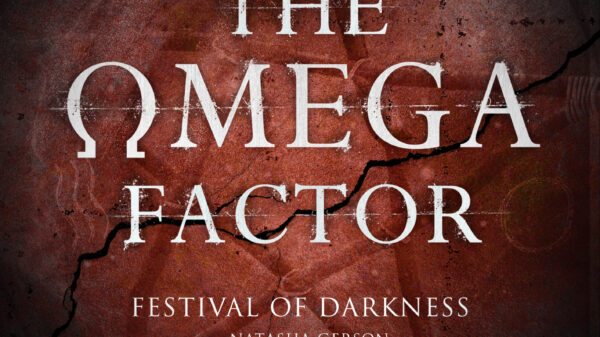Amidst the exuberant creativity and youthful enthusiasm of the 1979 Edinburgh Fringe Festival an undercurrent of malevolence threatens to engulf the work of one talented group of young performers. These highly motivated and impressively skilled youngsters are involved with a project that the head of Department 7, the controversial paranormal investigation unit, has given his backing to. But a brooding darkness seems to be surrounding the work of Project Mercury, and the department’s newly reunited investigative duo are soon drawn into a mystery in which almost nothing that they encounter will turn out to be quite as it first appears.
Produced as both a book (print and electronic) and as a narrated audiobook, The Omega Factor: Festival of Darkness is the latest release in Big Finish’s continuing audio range based in the world of the 1979 supernatural TV chiller produced by BBC Scotland. The previous range of three full-cast adventures were all set in the present day, with investigator Anne Reynolds now being joined by Adam Crane the son of her previous (and now deceased) colleague Tom. The two earlier audiobooks in the range were set at the time of the original television show. This latest release bridges that divide, with a contemporary bookend framing a story that unfolds in the 1970s.
The Omega Factor was created by Jack Gerson, and his daughter Natasha appeared on screen in the TV series in the role of Morag. Festival of Darkness is the first book to be authored by Natasha Gerson, who has already reprised her role in the recent audio dramas. As well as wrapping the story in opening and closing chapters that take the perspective of Adam Crane (who’s invited to review the case notes from 1979 by Anne), Gerson makes the extremely effective decision to structure the story by passing the book’s first person voice back and forth amongst a growing list of characters. Each offers their own account of events and a different (and often conflicting) viewpoint on the evolving and increasingly fraught storyline.
Gerson quite rightly takes time to flesh out her story, beginning by bringing back together the “dream team” of Tom Crane and Anne Reynolds. By this point in The Omega Factor timeline, a disaffected Tom had quit the department and decamped to London leaving his colleague (and some time partner) Anne reeling in his wake. The complex dynamic between the pair is central to the appeal of the series, and Gerson recognizes the need to make time to explore their attempts to rekindle their intimate-but-awkward relationship. There’s space too for the fiery conflict between Tom and his sometime boss Martindale to reignite. All of this takes place in the context of the pressing need to protect the young actors, dancers and musicians pulled into the orbit of the Mercury Project.
Louise Jameson (who has played the role of Anne Reynolds in all of the versions of The Omega Factor) voices the book with an eloquence and confidence that cannot fail but to draw the listener in. Her vocalisation of Anne, Tom and Adam are sympathetic and recognisable, replete with all of the emotional texture you’d expect. As well as her key protagonists, Jameson also delivers a whole range of different Scottish voices and dialects and shifts effortlessly between each of them – even the unpleasant sounding timbre of the villains and monsters.
As a series, The Omega Factor was concerned with the unsettling, the unexplained and the disturbing rather than with outright horror, and Gerson adopts a similarly in-keeping tone for her original story. The Edinburgh Festival, particularly in the analogue context of the late seventies, provides an evocative setting in which the mystery can unfold. Gerson conjures up an atmospheric and convincing sense of geography and of place as well as of time, without that feeling forced. The environs of Edinburgh, and especially its streets, alleyways and its many drinking establishments are all integral components of the storyline. She knows her Scottish single malts too.
Gerson writes with an entertaining turn of phrase and there’s great texture and substance to the unfolding of what develops into quite an intricate plot. Things build towards an alarming showdown between the forces of good and evil, in which the stakes are extraordinarily high. If Gerson’s final payoff is not completely up to the job of settling all of the plot elements that she has carefully brought into play, there’s still enough sense of closure and of a settling of accounts between all of the key players.
An absorbing audio thriller, this demonstrates Natasha Gerson’s ability to conjure up a faithful sense of the clash between forces on the fringe of the supernatural world that her father originally brought to life so memorably back in the 1970s. This comes highly recommended, even for those who those who would consider the prospect of being stuck amidst the maelstrom of the street entertainers, leafleteers, “improv” artistes, mimes and jugglers of the Edinburgh Fringe the very embodiment of hell on earth.
By way of an extra feature, Louise Jameson provides thoughtful and reflective answers to a series of questions about the TV and audio incarnations of The Omega Factor sent in by fans.

